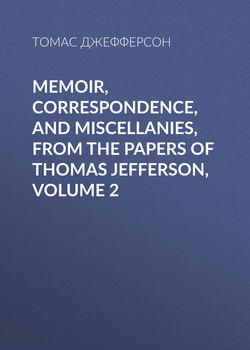Читать книгу Memoir, Correspondence, And Miscellanies, From The Papers Of Thomas Jefferson, Volume 2 - Томас Джефферсон, Thomas Jefferson - Страница 4
LETTER IV.—TO JOHN JAY, April 23, 1786
ОглавлениеTO JOHN JAY.
London, April 23, 1786.
Sir,
In another letter of this day, I stated to you what had passed with public characters since my arrival here. Conversations with private individuals, I thought it best not to mingle with the contents of that letter. Yet, as some have taken place, which relate to matters within our instructions, and with persons whose opinions deserve to have some weight, I will take the liberty of stating them. In a conversation with an ancient and respectable merchant of this place, such a view of the true state of the commercial connections of America and Great Britain was presented to him, as induced him to acknowledge they had been mistaken in their opinions, and to ask, that Mr. Adams and myself would permit the chairman of the committee of American merchants to call on us. He observed, that the same person happened to be also chairman of the committee of the whole body of British merchants; and that such was the respect paid to his person and office, that we might consider what came from him, as coming from the committees themselves. He called on us at an appointed hour. He was a Mr. Duncan Campbell, formerly much concerned in the American trade. We entered on the subject of the non-execution of the late treaty of peace, alleged on both sides. We observed, that the refusal to deliver the western posts, and the withdrawing American property, contrary to express stipulation, having preceded what they considered as breaches on our part, were to be considered as the causes of our proceedings. The obstructions thrown by our legislatures in the way of the recovery of their debts, were insisted on by him. We observed to him, that the great amount of the debt from America to Great Britain, and the little circulating coin in the formeer country, rendered an immediate payment impossible; that time was necessary; that we had been authorized to enter into explanatory arrangements on this subject; that we had made overtures for the purpose, which had not been attended to, and that the States had, therefore, been obliged to modify the article for themselves. He acknowledged the impossibility of immediate payment, the propriety of an explanatory convention, and said, that they were disposed to allow a reasonable time. We mentioned the term of five years, including the present; but that judgments might be allowed immediately, only dividing the execution into equal and annual parts, so that the last should be levied by the close of the year 1790. This seemed to be quite agreeable to him, and to be as short a term as would be insisted on by them. Proceeding to the sum to be demanded, we agreed that the principal, with the interest incurring before and after the war, should be paid; but as to that incurring during the war, we differed from him. He urged its justice with respect to themselves, who had laid out of the use of their money during that period. This was his only topic. We opposed to it all those which circumstances, both public and private, gave rise to. He appeared to feel their weight, but said the renunciation of this interest was a bitter pill, and such a one as the merchants here could not swallow. He wished, that no declaration should be made as to this article: but we observed, that if we entered into explanatory declarations of the points unfavorable to us, we should expect, as a consideration for this, corresponding declarations on the parts in our favor. In fact, we supposed his view was to leave this part of the interest to stand on the general expressions of the treaty, that they might avail themselves, in individual cases, of the favorable dispositions of debtors or of juries. We proceeded to the necessity of arrangements of our future commerce, were it only as a means of enabling our country to pay its debts. We suggested, that they had been contracted while certain modes of remittance had existed here, which had been an inducement to us to contract these debts. He said he was not authorized to speak on the subject of the future commerce. He appeared really and feelingly anxious, that arrangements should be stipulated as to the payment of the old debts, said he would proceed in that moment to Lord Caermarthen’s, and discuss the subject with him, and that we might expect to hear from him. He took leave, and we have never since heard from him or any other person on the subject. Congress will judge how far these conversations should influence their future proceedings, or those of the States.
I have the honor to be, with the highest respect and esteem, Sir, your most obedient, humble servant,
Th: Jefferson.
